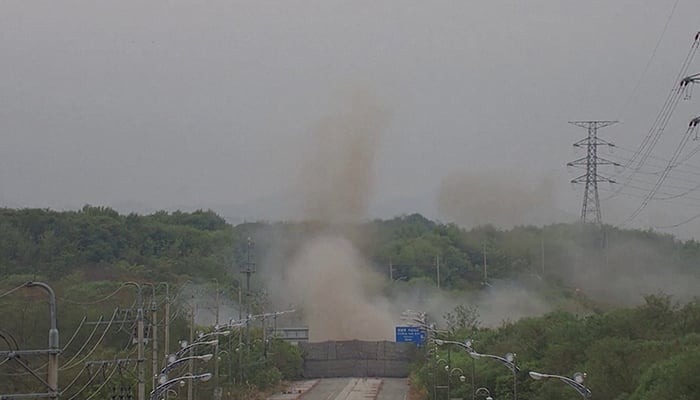
- Seoul says North Korea's actions violate previous agreements.
- North Korea has planted landmines and barriers on the border.
- North Korea accuses its neighbor of sending drones over Pyongyang.
North Korea blew up sections of inter-Korean roads and railway lines on its side of the heavily fortified inter-Korean border on Tuesday, prompting the South Korean military to fire warning shots.
Pyongyang said last week it would completely cut off inter-Korean roads and railways and further fortify areas on its side of the border as part of its push for a “two-state” system that negates its long-term goal of unification.
The South Korean Joint Chiefs of Staff said that around midday on Tuesday, some northern parts of roads and railway lines connecting to the south were destroyed.
Seoul's Unification Ministry, which handles cross-border affairs, condemned the incident as a clear violation of previous inter-Korean agreements, calling it “extremely abnormal.”
“It is unfortunate that North Korea repeatedly engages in such reactionary behavior,” ministry spokesman Ko Byung-sam said at a press conference.
Tensions rose after North Korea last week accused Seoul of sending drones over Pyongyang. North Korea said the drones distributed a “large number” of anti-North Korea leaflets, and Kim Yo Jong, leader Kim Jong Un's powerful sister, warned on Tuesday that Seoul would “pay a heavy price.”
The South Korean government refused to specify whether the South Korean military or civilians were the ones who flew the alleged drones.
Clashes also broke out between the two Koreas over garbage balloons launched since May from North Korea. Pyongyang said the launches were in response to balloons sent by anti-regime activists in the South.
After the demolitions that took place on Tuesday, a video clip published by the South Korean army showed an explosion and a column of smoke rising over an area of the road where the North had erected a black barrier.
It also showed several dump trucks and earthmovers approaching with a group of North Korean military officials monitoring and directing the vehicles.
She added that in response to the explosions, the South Korean army fired warning shots south of the military demarcation line, although there was no damage on the Korean side of the border.
Signs of ancient reconciliation
Pyongyang has been taking steps to sever inter-Korean ties, and redefine the South as a separate enemy state, since Kim Jong Un declared it a “major enemy” earlier this year and said unification was no longer possible.
The two Koreas are still technically at war after the war between them, which took place between 1950 and 1953, ended with an armistice and not a peace treaty.
Cross-border roads and railways are remnants of the rapprochement that included the 2018 summit. Unification Ministry data showed Seoul has allocated more than $132 million to rebuild ties in the form of cheap loans to Pyongyang.
“It was a major inter-Korean cooperation project carried out at the request of the North,” ministry spokesman Ko said, adding that Pyongyang was still obligated to repay the loans.
In 2020, North Korea blew up a joint liaison office set up in a border town after the collapse of nuclear talks with the United States.
South Korea filed a lawsuit in 2023 against the North, seeking damages amounting to about 45 billion won ($33 million) from the demolition of the joint office.
Chinese Foreign Ministry spokesman Mao Ning said at a press conference that Beijing was concerned about the developments and wanted to “avoid further escalation of the conflict.”
The government of South Korea's Gyeonggi Province, which borders the North, said on Tuesday that a special police force would be sent to crack down on the practice of launching anti-North Korean leaflets from some border areas.
South Korea's Constitutional Court overturned the ban on such launches last year.
Supporters say leaflet campaigns should be respected as free speech, but critics and some lawmakers say police should block them if they threaten lives and safety.
